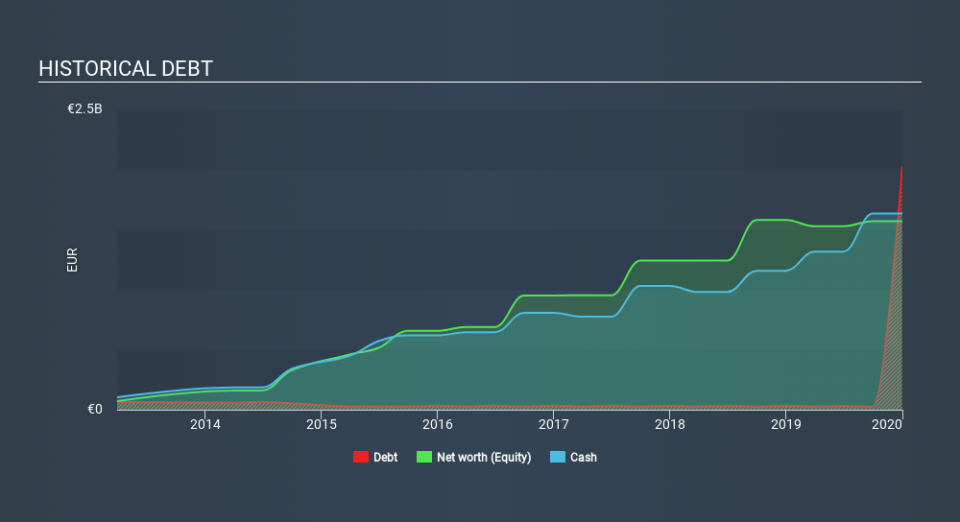Does Wizz Air Holdings (LON:WIZZ) Have A Healthy Balance Sheet?

Howard Marks put it nicely when he said that, rather than worrying about share price volatility, 'The possibility of permanent loss is the risk I worry about... and every practical investor I know worries about. So it might be obvious that you need to consider debt, when you think about how risky any given stock is, because too much debt can sink a company. We note that Wizz Air Holdings Plc (LON:WIZZ) does have debt on its balance sheet. But the more important question is: how much risk is that debt creating?
Why Does Debt Bring Risk?
Generally speaking, debt only becomes a real problem when a company can't easily pay it off, either by raising capital or with its own cash flow. Ultimately, if the company can't fulfill its legal obligations to repay debt, shareholders could walk away with nothing. However, a more frequent (but still costly) occurrence is where a company must issue shares at bargain-basement prices, permanently diluting shareholders, just to shore up its balance sheet. Of course, the upside of debt is that it often represents cheap capital, especially when it replaces dilution in a company with the ability to reinvest at high rates of return. When we think about a company's use of debt, we first look at cash and debt together.
Check out our latest analysis for Wizz Air Holdings
What Is Wizz Air Holdings's Debt?
The image below, which you can click on for greater detail, shows that Wizz Air Holdings had debt of €26.8m at the end of September 2019, a reduction from €31.8m over a year. However, it does have €1.63b in cash offsetting this, leading to net cash of €1.61b.
A Look At Wizz Air Holdings's Liabilities
Zooming in on the latest balance sheet data, we can see that Wizz Air Holdings had liabilities of €1.07b due within 12 months and liabilities of €1.76b due beyond that. On the other hand, it had cash of €1.63b and €252.3m worth of receivables due within a year. So its liabilities total €949.8m more than the combination of its cash and short-term receivables.
While this might seem like a lot, it is not so bad since Wizz Air Holdings has a market capitalization of €3.69b, and so it could probably strengthen its balance sheet by raising capital if it needed to. But it's clear that we should definitely closely examine whether it can manage its debt without dilution. While it does have liabilities worth noting, Wizz Air Holdings also has more cash than debt, so we're pretty confident it can manage its debt safely.
In addition to that, we're happy to report that Wizz Air Holdings has boosted its EBIT by 43%, thus reducing the spectre of future debt repayments. When analysing debt levels, the balance sheet is the obvious place to start. But ultimately the future profitability of the business will decide if Wizz Air Holdings can strengthen its balance sheet over time. So if you want to see what the professionals think, you might find this free report on analyst profit forecasts to be interesting.
But our final consideration is also important, because a company cannot pay debt with paper profits; it needs cold hard cash. Wizz Air Holdings may have net cash on the balance sheet, but it is still interesting to look at how well the business converts its earnings before interest and tax (EBIT) to free cash flow, because that will influence both its need for, and its capacity to manage debt. In the last three years, Wizz Air Holdings's free cash flow amounted to 43% of its EBIT, less than we'd expect. That's not great, when it comes to paying down debt.
Summing up
Although Wizz Air Holdings's balance sheet isn't particularly strong, due to the total liabilities, it is clearly positive to see that it has net cash of €1.61b. And it impressed us with its EBIT growth of 43% over the last year. So we don't think Wizz Air Holdings's use of debt is risky. We'd be motivated to research the stock further if we found out that Wizz Air Holdings insiders have bought shares recently. If you would too, then you're in luck, since today we're sharing our list of reported insider transactions for free.
If you're interested in investing in businesses that can grow profits without the burden of debt, then check out this free list of growing businesses that have net cash on the balance sheet.
If you spot an error that warrants correction, please contact the editor at editorial-team@simplywallst.com. This article by Simply Wall St is general in nature. It does not constitute a recommendation to buy or sell any stock, and does not take account of your objectives, or your financial situation. Simply Wall St has no position in the stocks mentioned.
We aim to bring you long-term focused research analysis driven by fundamental data. Note that our analysis may not factor in the latest price-sensitive company announcements or qualitative material. Thank you for reading.

 Yahoo Finance
Yahoo Finance 
